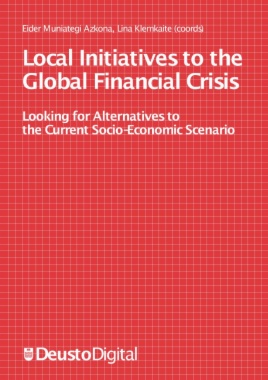This book consists of a number of articles presented at the I DUSKE INTERNATIONAL FORUM ?LOCAL INITIATIVES TO THE GLOBAL FINANCIAL CRISIS? that took place at the University of Deusto on the 24th-26th of February 2010. The forum aimed to be a meeting point and a platform for interdisciplinary exchange of ideas, experiences and initiatives among participants both from Sylff and non-Sylff scientific and professional communities in the light of the 2007-2008 international financial crisis, focusing on feasible, reasonable and creative alternatives to the current socio-economic world view. Moreover, through the forum we exposed and explored some concrete examples of how ordinary people are dealing with and responding to the financial and social challenges posed by the last crisis of capitalism in their everyday lives.
- Cover
- Title page
- Copyright page
- Index
- Introduction. Focus, Locus, Scope and Structure of the Book
- Part 1.Understanding the Crisis
- After the Mirage: Reasons for the Financial Collapse, its Consequences and Future Scenarios
- 1. Introduction: Milestones in the Financial Crisis
- 2. Reasons for the Financial Collapse: The Financial Industry Itself
- 3. Failures in Regulation and Supervision
- 4. Weak Theoretical Analysis
- 5. Short Term Thinking and Bad Incentives
- 6. Other Reasons for the Financial Collapse
- 7. Future Scenarios
- References
- The Reversibilitiy of Economic, Social and Cultural Rights in Crisis Contexts
- 1. Introduction
- 2. Nature of State Obligations in Relation to ESCR
- 3. Challenges in Monitoring the Prohibition of Retrogressive Measures
- References
- The Economic Crisis Framework: Privation of Rights and the Rise of Racism and Xenophobia
- 1. Immigrants and Crisis. Not a New Situation
- 2. Consequences of the Economic Crisis for the Immigrant Population
- 3. National Priority in Times of Crisis
- 4. Rise of Xenophobia
- 5. The Effects of the Crisis on the Most Vulnerable Population
- Part 2. Socio-Financial Alternatives
- The Pillars of Ethical Banking
- 1. What is Ethical Banking
- 2. Beyond Economic Profit: Financial Intermediation as a Social Good
- 3. The Responsibility for Giving Credit
- 4. The Challenges of an Ethical Banking Project
- 5. Legitimacy
- 6. Capacity
- 7. Growth Strategy
- 8. The Fiare Project
- 9. Practical Effects of the Financial Crisis in Ethical Banking Projects
- 10. Conclusions
- Moziki: Women’s Associations and Financial Support Groups in Kinshasa, Democratic Republic of Congo
- 1. Introduction and Historical Briefing on the Topic
- 2. Women’s Associations and Organizations in the Democratic Republic of Congo
- 3. Moziki Seen by the Congolese. Social Debate
- 4. The Internationalization of Moziki as Mutual Aid. Moziki Introduces its Activities to the World and the World Needs Moziki’s Activities
- 5. Moziki and Micro-Finance
- 6. Conclusions. Recommendations and Perspectives
- References
- Time Banking: Old Responses to New Challenges
- 1. Introduction
- 2. What are Time Banks? Functioning and Origins
- 3. Societies without Money. Marcel Mauss and The Gift
- 4. Research. Time Banks in Bilbao
- 5. Virtues of Time Banking
- 6. Conclusions
- References
- Part 3. Rethinking the Problem
- Beauty Will Save the World
- 1. Introduction
- 2. Aesthetical and Moral Beauty
- 3. The World of Crisis
- 4. Law as a Tool for Transformation
- 5. Means and Ends
- 6. Conclusion
- References
- Conclusions: Capitalism and its Dissatisfactions
- 1. Three Interpretations of The Crisis
- 2. Significations and Perversions of Money
- 3. Questions of Emancipation. Awareness and Alternatives
- References
- List of Contributors

